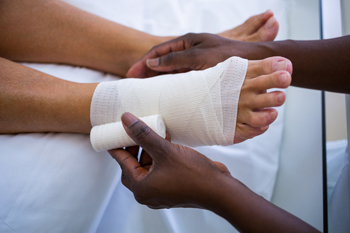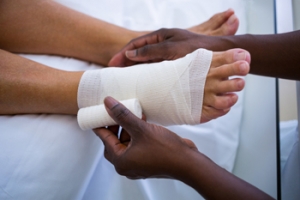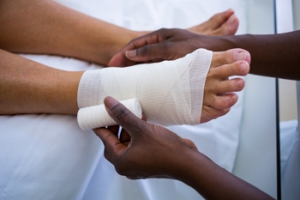Items filtered by date: January 2021
Signs That Foot Wounds Should Be Checked
An ulcer that develops on the foot is a wound that may not heal. This type of ailment can cause severe pain and discomfort and is common among diabetic patients. Redness on and around the affected area is often the first sign of a foot wound, and additional symptoms can include an unpleasant odor and possible drainage. There are several reasons why foot wounds may occur. These can consist of living a sedentary lifestyle, nerve damage, or circulation problems. Additionally, medical conditions such as high blood pressure and diabetes may make developing wounds on the feet more likely. If you are prone to foot wounds, it is strongly suggested that you are under the care of a podiatrist who can effectively treat this problem.
Wound care is an important part in dealing with diabetes. If you have diabetes and a foot wound or would like more information about wound care for diabetics, consult with Dr. Kenneth Donovan from Advanced Care Foot and Ankle. Our doctor will assess your condition and provide you with quality foot and ankle treatment.
What Is Wound Care?
Wound care is the practice of taking proper care of a wound. This can range from the smallest to the largest of wounds. While everyone can benefit from proper wound care, it is much more important for diabetics. Diabetics often suffer from poor blood circulation which causes wounds to heal much slower than they would in a non-diabetic.
What Is the Importance of Wound Care?
While it may not seem apparent with small ulcers on the foot, for diabetics, any size ulcer can become infected. Diabetics often also suffer from neuropathy, or nerve loss. This means they might not even feel when they have an ulcer on their foot. If the wound becomes severely infected, amputation may be necessary. Therefore, it is of the upmost importance to properly care for any and all foot wounds.
How to Care for Wounds
The best way to care for foot wounds is to prevent them. For diabetics, this means daily inspections of the feet for any signs of abnormalities or ulcers. It is also recommended to see a podiatrist several times a year for a foot inspection. If you do have an ulcer, run the wound under water to clear dirt from the wound; then apply antibiotic ointment to the wound and cover with a bandage. Bandages should be changed daily and keeping pressure off the wound is smart. It is advised to see a podiatrist, who can keep an eye on it.
If you have any questions, please feel free to contact one of our offices located in Warren, Livingston, and Toms River, NJ . We offer the newest diagnostic and treatment technologies for all your foot care needs.
Signs That Foot Wounds Should Be Checked
 An ulcer that develops on the foot is a wound that may not heal. This type of ailment can cause severe pain and discomfort and is common among diabetic patients. Redness on and around the affected area is often the first sign of a foot wound, and additional symptoms can include an unpleasant odor and possible drainage. There are several reasons why foot wounds may occur. These can consist of living a sedentary lifestyle, nerve damage, or circulation problems. Additionally, medical conditions such as high blood pressure and diabetes may make developing wounds on the feet more likely. If you are prone to foot wounds, it is strongly suggested that you are under the care of a podiatrist who can effectively treat this problem.
An ulcer that develops on the foot is a wound that may not heal. This type of ailment can cause severe pain and discomfort and is common among diabetic patients. Redness on and around the affected area is often the first sign of a foot wound, and additional symptoms can include an unpleasant odor and possible drainage. There are several reasons why foot wounds may occur. These can consist of living a sedentary lifestyle, nerve damage, or circulation problems. Additionally, medical conditions such as high blood pressure and diabetes may make developing wounds on the feet more likely. If you are prone to foot wounds, it is strongly suggested that you are under the care of a podiatrist who can effectively treat this problem.
Wound care is an important part in dealing with diabetes. If you have diabetes and a foot wound or would like more information about wound care for diabetics, consult with Dr. Kenneth Donovan from Advanced Care Foot and Ankle. Our doctor will assess your condition and provide you with quality foot and ankle treatment.
What Is Wound Care?
Wound care is the practice of taking proper care of a wound. This can range from the smallest to the largest of wounds. While everyone can benefit from proper wound care, it is much more important for diabetics. Diabetics often suffer from poor blood circulation which causes wounds to heal much slower than they would in a non-diabetic.
What Is the Importance of Wound Care?
While it may not seem apparent with small ulcers on the foot, for diabetics, any size ulcer can become infected. Diabetics often also suffer from neuropathy, or nerve loss. This means they might not even feel when they have an ulcer on their foot. If the wound becomes severely infected, amputation may be necessary. Therefore, it is of the upmost importance to properly care for any and all foot wounds.
How to Care for Wounds
The best way to care for foot wounds is to prevent them. For diabetics, this means daily inspections of the feet for any signs of abnormalities or ulcers. It is also recommended to see a podiatrist several times a year for a foot inspection. If you do have an ulcer, run the wound under water to clear dirt from the wound; then apply antibiotic ointment to the wound and cover with a bandage. Bandages should be changed daily and keeping pressure off the wound is smart. It is advised to see a podiatrist, who can keep an eye on it.
If you have any questions, please feel free to contact one of our offices located in Warren, Livingston, and Toms River, NJ . We offer the newest diagnostic and treatment technologies for all your foot care needs.


